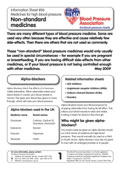Centrally acting drugs are a type of medicine that can be used to treat high blood pressure.
Also known as central alpha antagonists, they work directly on the part of the brain that controls blood pressure. They include clonidine, methyldopa, and moxonidine.
How do centrally acting drugs work?
Centrally acting drugs work directly on the part of the brain that controls blood pressure. They soften the force of your heart beat and block nerve signals that can make your small blood vessels contract. This allows them to relax and widen, making it easier for blood to flow through, lowering your blood pressure.
Who can take centrally acting drugs?
If you have high blood pressure, your doctor or nurse might suggest you take medicines to lower it. It can take some trial and error to find the right one or the right combination.
Centrally acting drugs are usually used if other drugs are not working well or are not suitable for you. For example, if you have side effects, have other health problems or are taking certain medications. They can also be used alongside other blood pressure medications.
Methyldopa can be a good option if you are pregnant, planning to get pregnant, or breastfeeding, as it has been shown to be safe and you will be closely monitored.
When are centrally acting drugs not suitable?
These medicines might not be suitable for you, or you might need closer monitoring, if you have other health problems. For example, if you have heart disease, kidney or liver disease, Parkinson’s disease, a history of depression, or rare tumours called phaeochromocytoma and paraganglioma.
They might also not be suitable if you are taking certain medications, including antidepressants, which could interfere with them.
Your doctor will consider your overall health and any treatments you’re having before giving you any new medicines.
Do centrally acting drugs have side-effects?
All medicines can have side effects, including blood pressure medicines. It’s likely you won’t have any side effects at all with centrally acting drugs, or you might have some that are minor and don’t cause you too many problems, and will usually pass with a couple of weeks.
If you have side effects which don’t improve and are affecting your day-to-day life, you should be able to try a lower dose or a different medicine.
Possible side effects of central alpha antagonists include:
- feeling drowsy, tired, weak or dizzy
- dry mouth
- upset stomach, diarrhoea or feeling sick
- swollen legs or feet
- headache
- sleep disturbance
- a sudden drop in blood pressure when you go from lying or sitting down to standing up (postural hypotension)
- a slow heartbeat
- depression and anxiety
- problems getting or keeping an erection
Methyldopa can sometimes cause liver problems. If you develop a fever or yellowing of your skin or eyes contact your doctor straight away.
The leaflet that comes with your medicine will have a full list of possible side effects.
Taking centrally-acting drugs
You take centrally acting drugs as tablets, between one and three times a day.
Check with your doctor or pharmacist before taking any other medicines at the same time as centrally-acting drugs, as they can interact, including medicines you buy over the counter such as painkillers and anti-inflammatories. Also tell you dentist if you are having any major treatments because can interfere with anaesthetic.
If you start taking high blood pressure medicines, it’s likely you will need to keep taking them for the long term. If your blood pressure stays under control for several years, you might be able to take a lower dose or stop taking them altogether.
It’s important that you don’t simply stop taking central-acting drugs because your blood pressure will quickly rise again. Always let your doctor, nurse or pharmacist know if you’re struggling because there could be other options you can try.
Read more
Non-standard medicines for high blood pressure information sheet
 Download our Non-standard medicines information sheet [PDF 23,510KB].
Download our Non-standard medicines information sheet [PDF 23,510KB].

